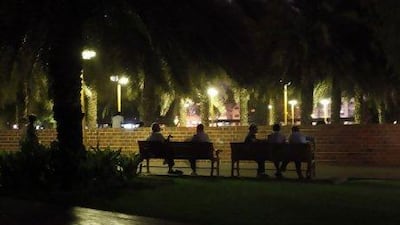Smitha Dilip, from India, walks her son to the park in Karama every evening. There, he runs free - at times, out of her sight - among the dozens of boys playing football, swatting at a badminton shuttlecock, or pedalling on bicycles around the lamp posts.
Women in saris chat on the benches around her. In a grassy area under the trees, a group holds awkward poses on mats. Couples stroll along a brick path, and a few men jog lightly.
Here at the park, in the heart of Karama, Ms Dilip has bumped into three friends she knew back in India - all of them, like her, were drawn to this bustling, middle-class, family-friendly Indian suburb because it feels like a home away from home.
"It's a little India," she says, relaxing on a park bench, a tricycle at her side. "You find a lot of the Indian community here. Families come to eat, then wander over to the park."
Among the countless shopfronts, restaurants and cafes dominate. The cuisine spans the subcontinent: from the barbecue mutton of Karachi Darbar to the international vegetarian Tamil chain Saravanaa Bhavan to the pav bhaji street food found in Mumbai.
In many restaurants, diners order in Indian languages. Waiters bring out silverware primarily for foreigners, and dash around scooping steaming rice from buckets.
Also part of the daily routine, the streets here fill with long caravans of traffic. Several cars queue up behind a double-parked Land Cruiser, as pedestrians stream in between the bumpers.
Still, the traffic is a breeze compared to back home, says Charles D'Souza, 48, a shop manager from Mangalore who has lived in Karama for 18 years. For him, that's the main appeal of this place - it's like India, but better.
Unlike at home, he says, he and his wife can walk outside at three in the morning without thinking twice. "In India it is too crowded," he says. And, while having access to all things India is great, he likes the added diversity here: Chinese noodles, Lebanese sweets, Indonesian soup, and more and more Filipino and Arab neighbours.
Many of them are workers squeezed eight to an apartment for as little as Dh350 a month. Their roommate-wanted ads are taped layer upon layer on walls around the neighbourhood. "Near metro," some of them boast.
The new station, and the many buses that sweep through here, are a big draw for the many residents who do not have cars.
"My brother chose to live in Karama because it's accessible to all," says Christine Cerojide, a 26-year-old Filipina sales clerk who lives with her sibling. "The fish market, supermarket are all walking distance," she says. "It's just like a city."
Indeed, almost anything is available after a few minutes' walk: fresh fish or pet fish, phone cards or birthday cards, DVD rentals or a DVD repair shop, T-shirts and a dry cleaner, money transfer centres, travel agents, car parts, indoor plants, bedroom curtains - and not to mention the goods at the hypermarkets or tightly-packed shopping centres.
Bina Shah, a 39-year-old Pakistani bank employee, says she likes to browse the markets here for their reasonable prices and their South Asian flair. The material for a shalwar kameez here starts at Dh45. A pair of jeans costs Dh30, eyebrow threading Dh10, dry-cleaning a shirt Dh4. For her haircuts (Dh60) she has been coming to Karama since 2001, even driving from Sharjah to make her appointment. She shops for earrings, children's shoes and new outfits for herself. "At the malls, you can find stuff. Here, you can find homeliness," she says.
The gold bangles and necklaces on display at Chittilappilly Jewellers cater to Indian, specifically Keralite, tastes, says salesman Rafi Kariparambil, who has lived and worked in Karama for a decade. He knows all the shopkeepers in the building, he says, and recognises half of the customers who drop in.
Old-timers get extra discounts. "It's natural," he says. "My customers are like family."

